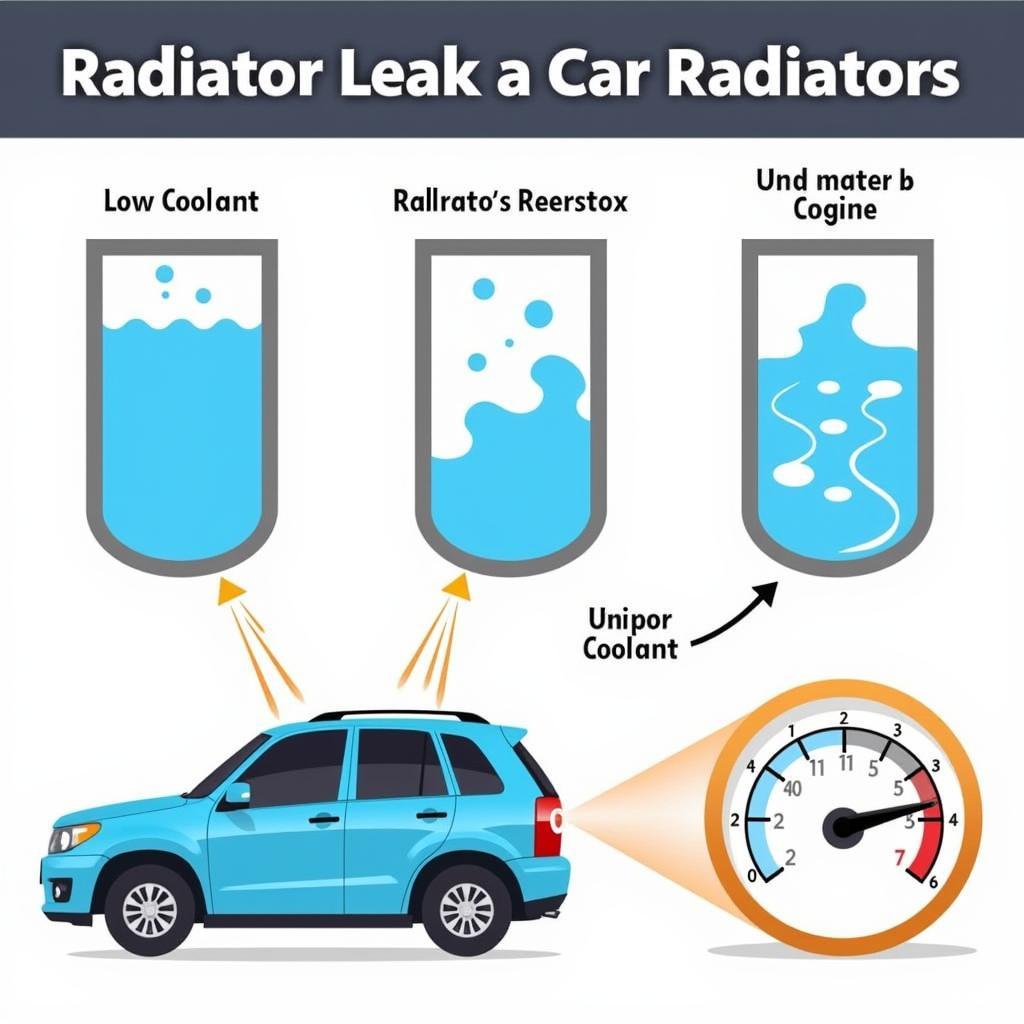A leaking car radiator can quickly lead to overheating and serious engine damage. Fixing a car radiator leak is crucial to maintain your vehicle’s health. This guide offers practical solutions for identifying, troubleshooting, and Fixing Car Radiator Leaks, whether you’re a DIY enthusiast or prefer professional assistance. fixing leaking radiator car
Identifying a Car Radiator Leak
The first step in fixing a car radiator leak is confirming the issue. Look for these telltale signs:
- Low coolant levels: Frequently checking your coolant reservoir is vital. A consistently low level indicates a potential leak.
- Visible puddles: Check for puddles of coolant under your car after it’s been parked for a while. Coolant is usually green, orange, or yellow, but can sometimes be clear.
- Overheating engine: A leaking radiator compromises the cooling system, leading to engine overheating. Watch out for the temperature gauge or warning lights.
- Sweet smell: Coolant has a distinctly sweet odor. If you smell it inside or around your car, suspect a leak.
- White smoke from the exhaust: This could indicate coolant is leaking into the combustion chamber, a serious problem requiring immediate attention.
 Identifying a Car Radiator Leak
Identifying a Car Radiator Leak
Common Causes of Car Radiator Leaks
Understanding the root cause helps in choosing the right fix. Common culprits include:
- Cracked radiator: Age, wear and tear, or physical impact can cause cracks in the radiator.
- Leaking hoses: Radiator hoses connect the radiator to the engine. They can become brittle and crack over time.
- Faulty radiator cap: The radiator cap maintains pressure in the cooling system. A faulty cap can lead to leaks or overheating.
- Damaged water pump: The water pump circulates coolant. A leaking water pump can contribute to coolant loss.
- Corrosion: Rust and corrosion can weaken the radiator and its components, leading to leaks.
Fixing a Leaking Radiator at Home
Some minor leaks can be addressed with DIY solutions:
- Radiator Stop Leak: This sealant can temporarily seal small leaks. Pour it into the radiator according to the product instructions.
- Epoxy or JB Weld: For small cracks in the radiator, you can try using epoxy or JB Weld. Clean the area thoroughly before applying.
However, these are temporary fixes. For larger leaks or persistent problems, professional repair is necessary. fixing a leaking radiator in a car
When to Seek Professional Help
For significant leaks, complex repairs, or if you’re unsure about DIY methods, consult a qualified mechanic. They have the expertise and tools to diagnose and fix the issue correctly. fixing a leaky car radiator
“Ignoring a radiator leak can lead to catastrophic engine failure,” cautions John Miller, a seasoned automotive technician with over 20 years of experience. “A timely repair can save you significant money and hassle in the long run.”
Preventing Future Radiator Leaks
Regular maintenance is key to preventing future leaks:
- Regular coolant flushes: Flush and replace your coolant according to your vehicle’s manufacturer recommendations.
- Inspect radiator hoses: Check hoses for cracks, bulges, or softness. Replace them if necessary.
- Test the radiator cap: Ensure the cap is holding pressure correctly.
- Use quality coolant: Use the correct type of coolant recommended for your vehicle.
Conclusion
Fixing a car radiator leak promptly is crucial for preventing further damage. Whether using a temporary fix or seeking professional help, addressing the issue head-on ensures your car stays on the road. Remember to follow preventative measures to minimize the risk of future leaks. For any car repair needs, don’t hesitate to contact us at AutoTipPro at +1 (641) 206-8880. Our office is located at 500 N St Mary’s St, San Antonio, TX 78205, United States. fix car engine leak
FAQs
- How much does it cost to fix a car radiator leak? The cost varies depending on the severity and cause of the leak.
- Can I drive with a leaking radiator? Driving with a leaking radiator can cause serious engine damage. It’s best to avoid driving until the leak is fixed. fix car on road
- How often should I check my coolant levels? It’s a good idea to check your coolant levels at least once a month.
- What color is coolant? Coolant is typically green, orange, or yellow, but can sometimes be clear.
- What does a leaking radiator smell like? Coolant has a sweet smell.
- How long can I drive with radiator stop leak? Radiator stop leak is a temporary solution and should not be relied upon for long-term use.
- Can I fix a cracked radiator myself? While minor cracks can sometimes be temporarily repaired with epoxy or JB Weld, it’s best to consult a professional for proper repair.




Leave a Reply